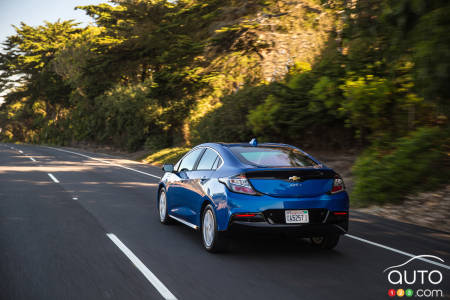• NHTSA is requiring a recall of 67 million potentially defective airbags.
• A rupture of the inflator when the airbag is deploying could send metal fragments flying into the vehicle's occupants.
• ARC's airbags are found in General Motors, Stellantis, Hyundai, Kia and BMW vehicles.
The NHTSA, the U.S. equivalent of Transport Canada caused quite stir this past Friday as it called for a recall of 67 million airbag inflators due to an identified safety problem.
To be clear, this airbag-related issue has no relation to the defective airbag inflators made by defunct Japanese manufacturer Takata. In this case, it involves a supplier by the name of ARC Automotive – which has, for now, rejected the U.S. regulatory agency's request.
The NHTSA says the inflators pose an unreasonable risk of death or injury.
And even though airbag ruptures involving its products are becoming more common, “ARC has not made a defect determination that would require a recall of this population,” NHTSA said in its letter to the Tennessee-based company. “Airbag inflators that project metal fragments into vehicle occupants, rather than properly inflating the attached air bag, create an unreasonable risk of death and injury.”
ARC airbag inflators are found in vehicles from General Motors, Stellantis, BMW, Hyundai and Kia.

A first GM recall
On Friday, GM agreed to recall nearly 1 million models equipped with the parts after a rupture in March resulted in a driver's facial injury. The recall affects 994,763 2014-2017 Buick Enclave, Chevrolet Traverse and GMC Acadia vehicles. Dealers will replace the driver airbag module.
The CRA rejected the NHTSA's tentative finding of a defect, stating that it was based on seven ruptures in the United States. The NHTSA “then asks ARC to prove a negative – that the 67 million inflators in this population are not defective.” Those inflators have been produced over an 18-year period. The company said it would continue to work with NHTSA and manufacturers to evaluate the failures.
In 2016, the NHTSA opened an investigation into more than eight million airbag inflators manufactured by ARC after a driver died in Canada in a Hyundai vehicle. The agency had originally opened an investigation in July 2015 following two reported injuries.
About 11 million of the inflators were actually manufactured by Delphi, which since been acquired by Autoliv ALV.N, under a licensing agreement with ARC. The rest of the 67 million inflators were manufactured by ARC itself. The manufacturer says there have been several programs to test inflators from scrapped models or other vehicles, but no failures have occurred during those tests.
The 67 million inflators were produced for the U.S. market on several production lines within different plants and were used by 12 manufacturers in dozens of models. "None of these manufacturers concluded that a systemic defect existed with the quantity of inflators," the ARC said.
NHTSA does point out that since January 2018, ARC has installed devices to detect problems directly on the production line. It is not aware of any failures or breaks with ARC inflators that have been produced since.
NHTSA has been closely studying airbag inflator failures for over 15 years.



